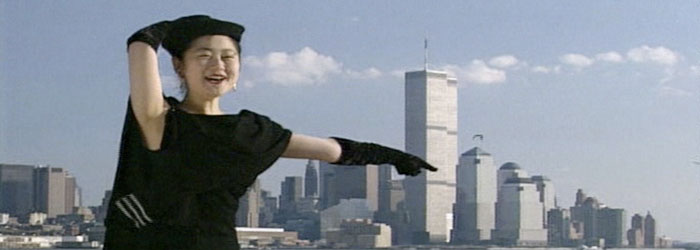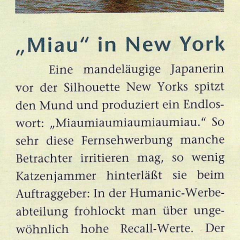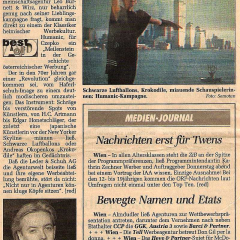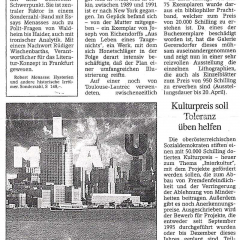New York/Vienna 1996 short film/tv spot 2×45 sec
HCN MIAU was a commercial commissioned by the Austrian shoe manufacturer HUMANIC for TV. HCN MIAU is an Anagram that uses all the letters of the company’s name. I extracted the letters H -C -N. Spoken they sound like HUDSON, the river flowing from the north, separating America’s mainland from the West side of Manhattan island. Yukika Kudo, in her first collaboration with Edgar Honetschläger, points at the WORLD TRADE CENTER and sings out the letters left of the ANAGRAM – MIAU! In another episode she is on a rooftop in Manhattan with all the letter combinations written on a pole. This time she crosses them out while miauing. HCN MIAU drew tremendous public response, but was to be the first and last commercial EH ever did.
cast Yukika Kudo
camera Wolfgang Lehner
editor Kurt Hennrich
written and directed by Edgar Honetschläger
producer Fischer Film
press/review
HCN MIAU New York, March, 1995
scroll down for German please
HCN MIAU is an anagram.
When spoken, the letters H-C-N extracted from HUMANIC (Austrian shoe company) sound like HUDSON, the river flowing from the North, separating America’s mainland from the West Side of Manhattan Island.
One can hardly imagine how hard it is in February, in deep winter that is, to find a rowboat in New York City. At first, it seemed more expensive to rent a boat than a truck for an entire week. After hours of calling around, I finally “hit gold” in the Bronx. With two women as bodyguards at my side I took a train to a small island up there.
In the backyard of a bar, in which corpulent men enjoyed their morning beers, we discovered a leaky little nutshell that looked like it would fit from its size. Two days later, the film crew crammed into a minibus, we picked up the boat. We tied it to the roof and off we were to New Jersey. Weeks before, I had discovered a great shooting location – a place that provided a perfect view of the skyline. There, we set up our equipment. Some smaller things were missing, so I took the car to get them. When I returned after an Odyssey, the crew was gone. The security guards of the land owner had made them leave the property. It was at this point that I realized that in the United States one needs a filming permit at every feasible location.
We drove along the coast of New Jersey to look for another location. Every little piece of land was fenced in and posted as private property – no trespassing. One sign said: student parking only. My conclusion, that these parking spaces were reserved for a university, turned out to be right. I ran up the stairs to the campus, asked for security and burst through the doors. In front of me sat an overweight cop. I blabbered something about film school and graduation that demanded a short film. He asked me whether I had been raped, or if some other terrible thing had happened to me, since I sounded so stressed out. After I had explained my cause he smiled at me and said: “if anyone bothers you, just tell him or her that chief Malkovsky said it’s okay.” We were under his personal protection and had permission to film the skyline from the parking lot, which was located directly on the Hudson. That day, the temperature was minus 10 degrees Celsius.
When we had finally set up our equipment in the driving wind, put the actress into position and I was in the boat rowing against the stream, the sun started to set. The lighting was no longer strong enough for shooting.We decided to come back the next day. Of course, we had only rented the car and boat for one day. The car would not be a problem, but what should we do with the boat? Left on top of the bus, it would certainly get stolen, therefore, we tied it up on the dock below the parking lot. On the trip home, somebody raised concerns that the East River, which flows right there into the ocean, would be affected by the tide.
The next day, this turned out to be right – the boat had sunk but was still dangling – thank God – on a thin rope. We hauled it out over the water, noticing that the paddles were missing. On the property adjacent to the parking lot, there were some hobos warming their hands by an open fire. When I asked them, they told me that they had burned one paddle, but they had seen another one in the water and offered to fish it out for $10.
I found a worn-out broom that I could use for a substitute paddle. I had to row a total four hours against the stream in order to stay in the same place all the time. Since the boat was leaking, I had to – in addition to fervent rowing – use a cup to bail water overboard in order to keep myself from sinking. When the shoot was finally finished, I was totally soaked and had blisters all over my fingers.
As I reached the shore, a young American offered to help us with pulling the boat out on the pier. Although I turned down his offer, he came over anyway and pulled the heavy boat up on to the bar. As all of us were then seeking shelter from the cold in the car, he asked for money for services rendered. I offered him $5, whereupon he threw himself on the ground and demanded compensation for a broken back. He was yelling that he would sue us. $20 and much persuasion skill finally were sufficient for him to leave us. After the shoot, everyone laid in bed for a week with the flu.
HCN MIAU New York, 3/1995
HCN MIAU ist ein Anagramm.
Die aus Humanic extrahierte Buchstabenfolge H-C-N klingt ausgesprochen wie HUDSON, jener Fluss, der von Norden kommend das Festland Amerika von der Westseite der Insel Manhattan abgrenzt.
Kaum jemand kann sich vorstellen, wie schwer es ist, im Februar, also zur tiefsten Winterzeit, ein Ruderboot in New York aufzutreiben. Anfangs schien es teurer, ein Boot zu mieten als einen Lastwagen für eine ganze Woche. Schließlich wurde ich nach stundenlangem Telefonieren in der Bronx fündig. Mit zwei Damen als Schutz fuhr ich am nächsten Tag auf eine kleine Insel in jenem Stadtteil.
Im Hinterhof einer Bar, in der korpulente Herren ihr Vormittagsbier genossen, entdeckten wir ein etwas leckes Plastikschinakl, das von der Größe her zu passen schien. Zwei Tage später holte ich jenes Boot, das Kamerateam in den Minibus gepackt, ab. Wir schnürten es aufs Dach und ab gings nach New Jersey. Ich hatte Wochen zuvor einen idealen Drehort entdeckt – d.h. eine Stelle, von der aus die Skyline am schönsten zu sehen war. Dort bauten wir unser Gerät auf. Einige kleine Dinge fehlten, also machte ich mich mit dem Auto auf, um sie zu besorgen. Als ich nach einer Odyssee zurückkamen, war das Kamerateam verschwunden. Der Sicherheitsdienst des Landbesitzers hatte sie zum Verlassen des Geländes veranlasst. Spätestens da wurde klar, dass man in den Vereinigten Staaten an jedem nur erdenkbarem Ort eine Dreherlaubnis braucht. Wir fuhren die Küste von New Jersey entlang, um nach einem anderen Ort zu suchen. Jeder Flecken war umzäunt und als Privatbesitz ausgewiesen. Auf einem Schild war zu lesen: Dieser Parkplatz ist für Studenten reserviert. Meine Schlussfolgerung, dass es sich um Parkplätze für eine Universität handeln musste, stellte sich als richtig heraus. Ich rannte die Stufen zum Campus hinauf, fragte nach dem Sicherheitsdienst und stürmte durch die Tür. Vor mir saß ein übergewichtiger Cop, dem ich etwas von Filmhochschule und Diplomarbeit vorschwafelte. Zuerst fragte er mich, ob ich denn vergewaltigt worden wäre, oder mir etwas anderes Schreckliches zugestoßen sei, da ich so abgehetzt klänge. Nachdem ich alles aufgeklärt hatte, teilte er seinen Untergebenen mit, dass wir unter seinem persönlichen Schutz stünden und ausdrücklich Erlaubnis hätten, vom Parkplatz aus, welcher direkt am Hudson lag, die Skyline zu filmen. Vielleicht ist nun der Zeitpunkt gekommen, darauf hinzuweisen, dass es an diesem Tag 10 Grad minus hatte. Als wir endlich alles in scharfem Wind aufgebaut hatten, die Schauspielerin in Position stand und ich im Boot ruderte, ging die Sonne unter. Das Licht war nicht mehr stark genug, um die Kontraste einzufangen.
Wir beschlossen am nächsten Tag wiederzukommen. Allerdings hatten wir Auto und Boot nur für einen Tag gemietet. Das Auto ließ sich regeln, aber wohin mit dem Boot?
Auf dem Dach des Busses würde es mit Sicherheit gestohlen werden, also kamen wir überein, es am Dock unter dem Parkplatz festzubinden. Noch am Heimweg gab es Diskussionen, ob der Fluss, welcher an jener Stelle direkt in das Meer mündet, wohl von der Flut ergriffen werde oder nicht. Am nächsten Tag lernten wir, dass dem so war, denn das Boot war untergegangen, hing aber Gott sei Dank noch an einem dünnen Seil. Wir hieften es aus dem Wasser, um festzustellen, dass die Ruder verschwunden waren. An dem an den Parkplatz anschließenden Grundstück wärmten sich einige Sandler die Hände am offenen Feuer. Auf meine Frage meinten sie, eines der Ruder im Wasser entdeckt zu haben und versprachen dieses gegen 10$ herauszufischen. Das zweite Paddel hatten sie verbrannt. Doch ich fand einen alten abgenützten Besen, den ich nun in der Not als Ruder verwendete. Ich musste insgesamt vier Stunden gegen die Strömung rudern, um am gleichen Punkt des Flusses zu verharren. Als die Dreharbeiten endlich abgeschlossen waren, hatte ich an allen Fingern Blasen und war durch und durch nass. Da das Boot leck war, hatte ich zusätzlich zum endlosen Rudern die Aufgabe gehabt, mit einem Becher eindringendes Wasser über Bord zu kippen. Als wir das Boot einholten, bot ein junger Amerikaner, der uns bei unserer Arbeit beobachtet hatte, an, uns zu helfen. Obwohl ich sein Angebot zurückwies, ließ er sich nicht davon abhalten, das schwere Boot auf den Steg zu ziehen. Als wir alle vor der Kälte im Auto Unterschlupf suchten, verlangte er Geld für den geleisteten Dienst. Ich bot ihm 5 $, worauf er sich auf den Boden warf und Schadenersatz für einen gebrochenen Rücken forderte. Er brüllte, dass er uns klagen würde. 20$ und viel Überredungskunst ließen ihn davon absehen. Nach dem Dreh lagen alle mit Grippe für eine Woche im Bett.
HCN MIAU New York, 3/1995



